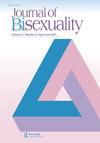Exploring Clinicians’ Knowledge, Beliefs and Clinical Experiences Related to Pansexual Youth
IF 1.9
Q2 SOCIAL SCIENCES, INTERDISCIPLINARY
引用次数: 1
Abstract
Abstract Pansexuality is the emotional, romantic, and/or sexual attraction toward people regardless of their biological sex, gender identity, or gender expression. This study examined what clinicians know about pansexuality and their clinical experiences; 84 clinicians from different cultural backgrounds with an age range from 20-60 years old were examined. Participants were recruited through purposive sampling. Recruitment for the study utilized email advertisements containing a description of the study. Further, participants responded to open-ended survey questions related to working therapeutically with pansexual youth. Thematic analysis was utilized to gain a deeper understanding of specific ideologies, biases, and knowledge that these clinicians held. Pertinent themes emerged from the thematic analysis: unique challenges experienced by pansexual youth, working therapeutically with pansexual youth, and therapists’ beliefs and assumptions. The results showcased the need for clinicians to be more mindful of biases, to further their training on sexual minority populations, and for overall advocacy. Clinical implications suggest professional mental health clinicians, therapists, and psychologists to implement trainings and practices that include pansexual youth and the LGBTQ + community without personal biases and assumptions in therapy sessions or during assessments.探讨临床医生对泛性恋青年的知识、信念和临床经验
泛性恋是指对他人的情感、浪漫和/或性吸引,与他们的生理性别、性别认同或性别表达无关。这项研究调查了临床医生对泛性恋的了解以及他们的临床经历;对84名年龄在20 ~ 60岁的不同文化背景的临床医生进行了调查。参与者是通过有目的的抽样招募的。该研究的招募使用了包含研究描述的电子邮件广告。此外,参与者回答了与治疗泛性恋青年有关的开放式调查问题。专题分析被用来更深入地了解这些临床医生所持有的具体意识形态、偏见和知识。相关的主题从主题分析中浮现出来:泛性恋青年所经历的独特挑战,与泛性恋青年进行治疗工作,以及治疗师的信念和假设。结果表明,临床医生需要更加注意偏见,进一步对性少数群体进行培训,并进行全面宣传。临床意义建议专业的心理健康临床医生、治疗师和心理学家在治疗过程或评估过程中,不带个人偏见和假设,对泛性恋青年和LGBTQ +社区进行培训和实践。
本文章由计算机程序翻译,如有差异,请以英文原文为准。
求助全文
约1分钟内获得全文
求助全文
来源期刊

Journal of Bisexuality
SOCIAL SCIENCES, INTERDISCIPLINARY-
CiteScore
2.60
自引率
17.60%
发文量
32
期刊介绍:
The Washington Quarterly (TWQ) is a journal of global affairs that analyzes strategic security challenges, changes, and their public policy implications. TWQ is published out of one of the world"s preeminent international policy institutions, the Center for Strategic and International Studies (CSIS), and addresses topics such as: •The U.S. role in the world •Emerging great powers: Europe, China, Russia, India, and Japan •Regional issues and flashpoints, particularly in the Middle East and Asia •Weapons of mass destruction proliferation and missile defenses •Global perspectives to reduce terrorism
 求助内容:
求助内容: 应助结果提醒方式:
应助结果提醒方式:


